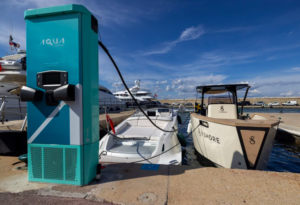Shock verdict: Boat owners not eligible for Returned Goods Relief

Recreational boat owners, established in the UK, who lawfully purchased and kept their boat in the EU at the time the UK was an EU member, will not be eligible for Returned Goods Relief (RGR), the government has advised.
It’s a disappointing outcome felt by the Royal Yachting Association, British Marine, Association of Brokers and Yacht Agents and the Cruising Association.
Lesley Robinson, CEO of British Marine, says her organisation will work with its strategic partners to challenge the decision and press for a change in policy.
“This is obviously very disappointing news in light of the previous commitments from government to support UK boat owners bringing their vessels back to the UK,” she says.
At a recent meeting with HMRC (14 December 2022), the lobbying team were informed of the government’s decision to reject the proposal by the RYA allowing recreational boat owners, established in the UK, who lawfully purchased and kept their boat in the EU at the time the UK was an EU member, to be eligible for RGR.
This follows a few years of back and forth on decisions.
Back in April 2019, the government said: “The intended UK policy is that a UK vessel will not lose its status as VAT paid in the UK because it is outside UK territorial waters on EU exit day. When the vessel returns to the UK the person responsible for the vessel can claim Returned Goods Relief.”
Then in November 2020, the government reaffirmed: “If a vessel was re-imported during 2021, it would be sufficient to show that any sale or transfer or ownership had been made in compliance with [EU] VAT legislation.”
It was not until 17 December 2020 that HMRC stated that the advice it gave on 3 November 2020 was incorrect and that it would be unable to apply an easement for returning vessels after the UK left the EU. This gave boat owners just 14 days to rebase their boats to the UK to avoid a second VAT charge. Given the distance, winter weather conditions and above all covid travel restrictions, this was not only unrealistic, but for most, it was simply impossible.
“This proposal has been with the government since January 2022 following the successful case we made for an easement of the three-year RGR condition,” says Mel Hide, RYA’s director of external affairs. “It is therefore a deeply disappointing outcome and falls well short of resolving the issue for those who have been caught out by incorrect advice provided by the government. It would also seem to fall short of the government’s commitment to assist UK industry as we forge our future outside of the EU. We must now consider what action we can collectively take to seek a better outcome.”
October 2020
RYA seeks more guidance from HM Treasury on Returned Goods Relief — HM Treasury shares its updated plans for an extension period of one year on its Returned Goods Relief policy.
November 2020
Peters & May urge boat owners to think Brexit and VAT, saying that in its understanding from 1 January 2021, the rule that yachts must return to the UK within three years of having last left the UK/EU in order to be entitled to Returned Goods Relief on duty, and VAT will be strictly enforced.
February 2021
The Cruising Association officially starts campaigning to reduce the impact of Brexit on British small boat cruisers.
The Royal Yachting Association (RYA) and British Marine (BM) add their voices to the campaign to challenge HMRC’s post-Brexit plans for private leisure craft.
March 2021
HM Revenue and Customs (HMRC) announces a six-month extension to the one-year grace period previously put in place by the government.
April 2021
Industry collaboration yields confirmation on post-Brexit VAT and release guidance.
June 2021
Greek Customs authority acknowledges the rights of UK yachts to return to Greek waters and retain their EU VAT Status, following a complaint to the European Union (EU) by the Cruising Association.
December 2021
UK government confirms that from 1 January 2022, recreational boat owners will not be required to pay a second amount of UK VAT if their vessels have been outside the UK for more than three years.
February 2022
The Cruising Association announces that HMRC has followed through its proposed positive change to the application of RGR for recreational craft. This results in many boat owners no longer becoming liable to pay VAT on the return of their boats to the UK.
December 2022
Government advises recreational boat owners, established in the UK, who lawfully purchased and kept their boat in the EU at the time the UK was an EU member, will not be eligible for Returned Goods Relief.











This is getting real now and there will be financial consequences as buyers of yachts and boats will need to consider paying out VAT if paperwork is lacking on modern boats.
This will effectively reduce the value of boats by 20% if VAT paid status can’t be proven as so many yachts and boats in the UK have at some time been kept abroad. A great deal of motorcruisers that I have surveyed have been kept at some time in the Med and many have been brought back on lorries.
Yacht brokers often get arsey with me for recommending that the buyer checks VAT invoices, bills of sale, mooring receipts, insurance docs (proof of where a yacht has been kept), builder’s certificate and CE RCD declaration before paying deposit and I have had a few brokers suggest that it is none of my business and that surveyors are there to check the boat physically, not check paperwork.
But, if only I was given a pound for every yacht that I have surveyed where the owner has “lost” the proof of VAT invoice.
It used to happen a lot when yachts were bought through bogus companies to claim the VAT back or registered in Guernsey where no tax is paid. The amount of brokers who have used the words “we deem it to have VAT paid status”.
Only last week I surveyed a 2004 built 38’ yacht and found that the owner “could not find his paperwork”. The buyer (my client) forked out for a survey and lift ashore and was really looking forward to owning her but had to pull out. How could you lose this paperwork and how can you forget what dealer sold it and whether it had been kept abroad or not?
This sort of thing is going to happen more and more often and I’m convinced that the owner knew that he would have trouble. This wasted my client so much time and money and could have been avoided if the broker had done a bit of due diligence and got the paperwork in order beforehand.
Its going to happen more often and owners will just sail their boats back under the radar, register on the Part III SSR and do nothing. With time receipts will be “lost”.
Then, the owner will pass away and leave a mess for his/her children or widow.
I would be very angry if this applied to us and we kept our yacht abroad as we bought our French built yacht new in 2008 and were considering keeping it in France.
The bodies that are supposed to protect our interests have in this case been powerless and the government has lied and gone back on its word.
There are going to be implications for yacht owners, buyers, surveyors and brokers and I recommend to buyers that they check VAT status before making an offer. See a copy of the document and don’t just take peoples word for it as just like governments, people do tell lies.
I am pretty sure this only applies to boats bought in the EU and EU VAT paid and does not apply to UK boats that happened to be in the EU on BREXIT day.